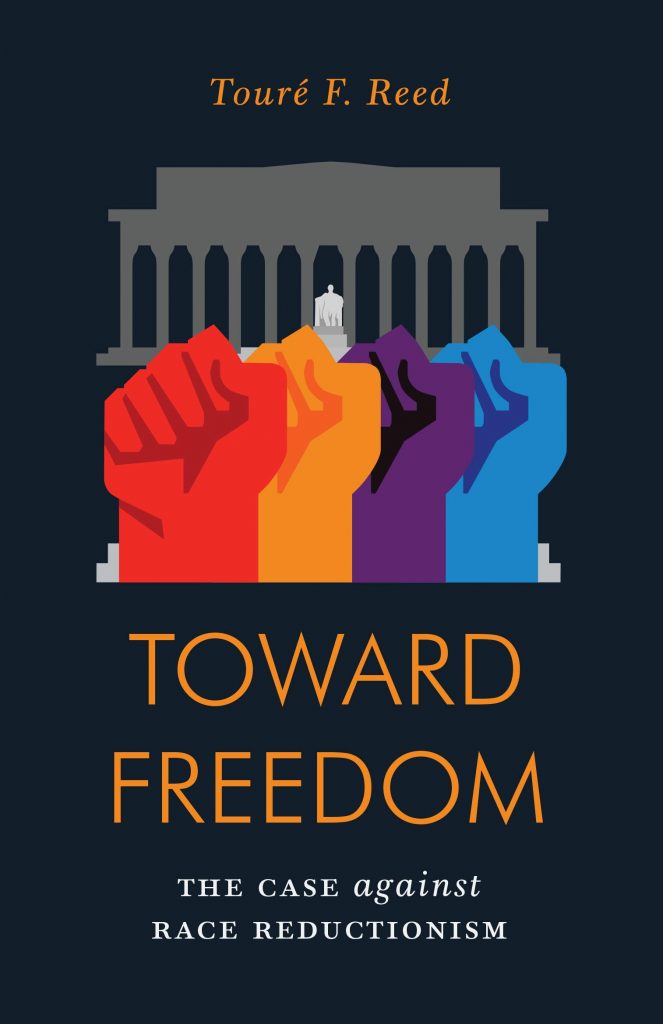In his new book, Toward Freedom: The Case Against Race Reductionism, Dr. Touré Reed, a professor of history at Illinois State University, challenges the commonplace misconception that lingering racial disparities in wealth, employment, and incarceration are owed—in part—to liberal policymakers’ failure to recognize the impact of racism on Black Americans.
Identity politics-informed accounts of contemporary disparities often allege liberal antiracist policies have been hobbled by a decades-long commitment to “class reductionism,” which refers to a singular focus on class at the expense of other challenges. Instead, Reed, who researches the impact of race and class ideologies on American civil rights politics and U.S. public policy, contends that postwar liberalism’s failure to end racial disparities is owed to liberal policymakers’ tendency towards, what he calls “race reductionism.”
“While it is true that Black civil rights leaders and labor leaders during the New Deal and World War II viewed racial inequality through the lens of economic inequality, by the time of the Cold War, class-informed understandings of inequality were displaced by culturalist or even racialist frameworks,” said Reed, who noted these frameworks treated racial inequities as exceptions to capitalism.
According to Reed, the antipoverty and antiracist policies advanced by Democratic presidential administrations from John F. Kennedy through Barack Obama failed to eliminate racial disparities because they uncoupled racial inequities from the political-economic processes that engendered them. “Since the 1960s, liberal social policies have been shaped by constructs such as ethnic pluralism, culture of poverty and underclass ideology, and even diversity and intersectionality, which have tended to impute a rigidity to race that understates its historically-contingent fluidity,” said Reed.
Reed argues the retreat from class-based politics since the postwar period has led liberal policymakers to attribute lingering racial disparities to either the alleged cultural failings of poor Blacks or the presumed ingrained racism of whites, with little regard for the impact of big economic trends on Blacks. “Ironically, what liberal policymakers have not done, then, is advocate agendas intended to counter the effects of issues like deindustrialization, the decline of the union movement, public sector retrenchment, and wage stagnation that have characterized the last 40 or more years of American life—all of which have impacted Blacks disproportionately.”
Civil rights leaders like A. Philip Randolph, Bayard Rustin, and even Martin Luther King Jr. were clear that antidiscrimination policies alone would fail to end disparities in employment or housing because the economic game had changed substantially between the 1940s and 1960s. — Touré Reed
In Toward Freedom, Reed contends policy prescriptions like those advocated by the Bernie Sanders campaign are essential to redressing racial disparities. “While some, like famed public intellectual Ta-Nahisi Coates or, ironically, Hillary Clinton and Joe Biden, disparaged Senator Sanders calls for programs like living wage policies, universal healthcare, expansion of the public sector, free public higher education as deflections from so-called Black issues, Sanders’s platform was actually very similar to policy prescriptions proposed by civil rights leaders during the 1960s,” said Reed, pointing to the organizers of the March on Washington for Jobs and Freedom (1963), the Freedom Budget for All (1966-1968), and the Poor People’s Campaign (1968).
“Civil rights leaders like A. Philip Randolph, Bayard Rustin, and even Martin Luther King Jr. were clear that antidiscrimination policies alone would fail to end disparities in employment or housing because the economic game had changed substantially between the 1940s and 1960s,” said Reed. He noted the Civil Rights Movement’s great legal and legislative victories came at a time when the United States was in the throes of a seismic economic change, which necessarily narrowed the impact of the blows struck to racist practices and policies by the courts and antidiscrimination legislation from the 1950s through the 1960s.
Many contemporary activists react negatively to calls for viewing racial inequality through the lens of American political-economy, perceiving those who insist that racial disparities are necessarily wed to class inequality as dismissing the issue of racism. Reed says this is a sleight of hand. “Racism is obviously a real social phenomenon that impacts people’s day to day life, including my own,” he said. “But while antidiscrimination policies remain necessary,” Reed said, “those who insist on treating racial inequality as if it exists in a world apart from its economic and political context are not only advocating, whether they know it or not, the same approach to ending racial disparities that has already proved incapable of redressing the needs of poor and working-class Black Americans, but they are also echoing a conservative, not a progressive, default in postwar American liberalism.”


